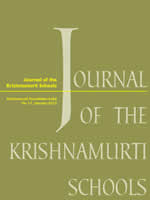Issue 17 - January 2013
- Written by J. Krishnamurti
Question: What kind of education should my child have, in order to face this chaotic world?
- Written by P Ramesh
Krishnamurti questioned the schools constantly about why they were producing mice instead of lions and gazelles.
- Written by Stephen Smith
We are probably all familiar with Krishnamurti’s statement, ‘The first step is the last step’, but what preoccupies teachers on a daily basis is how they will approach a particular student; how they will make their teaching ‘not boring’; and whether they have the tools for the job, both in terms of knowledge and psychological readiness.
- Written by Editors
'Academics' is a top priority in all educational institutions, for obvious reasons.
- Written by Adrienne Hoskins
Young children experience conflict every day, generated by differences in age, size, physical abilities, language, race, ethnicity and culture, religion, family structure, socioeconomic class and gender: 'No girls allowed!' Children wish to be treated fairly and they have problems with perceived unfairness.
- Written by Rupa Suresh
The junior school children, aged around eight, are in class for a geometry module.
- Written by G. Gautama
Ethic - a set of moral principles, esp. ones relating to or affirming a specified group, field or form of conduct: the puritan ethic was being replaced by the hedonist ethic.
- Written by Anand Mathew Kurien
The schools in India that derive their inspiration from the philosophy of Krishnamurti are different from the mainstream schools in many aspects.
- Written by Marina Basu and Nalini Jayaram
The love of beauty may express itself in a song, in a smile, or in silence; but most of us have no inclination to be silent.
- Written by Kabir Jaithirtha
This article is the result of a study, by teachers and parents at Shibumi, of a letter from the book The Whole Movement of Life is Learning.
- Written by Siddharth Menon
Recently, on a blackboard in a very public corridor used by students for good-natured but generally anonymous graffiti, something like the following had been neatly printed: SMILE WHEN YOU USE COMPUTERS IN THE COMPS LAB – YOU'RE UNDER CCTV.
- Written by Radha Gopalan and Sonali Sathaye
We are academicians-cum-practitioners, one from the environmental sciences and the other from the social sciences, coming together as teachers with the aim of re-envisioning an approach to environmental studies.
- Written by Akhila Seshadri
The right kind of education begins with the educator, who must understand himself and be free from established patterns of thought; for what he is, that he imparts.
- Written by R. Kripa
I am the mother all right, but I worry when my child assumes that I am the parent!’ As parents and teachers we had come together at the annual theme meeting at The School (KFI) to discuss our role in a child’s life and a child’s role in ours.
- Written by Andy Gilman
In late 2011 Oak Grove School facilitated a series of one-hour dialogues focused on an exploration of punishment and reward in educational practice.
- Written by Sonali Sathaye
This article is a rumination on what happens in us teachers when we 'teach' another.
- Written by Rajashree Sen
If there is anything that we wish to change in the child, we should first examine it and see whether it is not something that could better be changed in ourselves.
- Written by Valentin Guerlier
No one remembers why they called it the 'Concert'.
- Written by S. N. Bubey
I did not know J Krishnamurti personally and had only one occasion to see and hear him, but this talk is very vivid in my memory.
- Written by Rahee Dahake
I don't want to be a tree; I want to be its meaning.
- Written by Keerthi Mukunda
For some time now, I have been fascinated by what children are thinking about as they read.
- Written by Roopam Dubey
It was on a crisp winter morning, when the entire teacher body of Rajghat Besant School sat in the eastern verandah of our magnificent assembly hall that it was announced that articles were invited for the Journal of Krishnamurti Schools.
- Written by Kavitha Krishna
You never really understand a person until you consider things from his point of view ...
- Written by Gopal Krishnmaurthy with Craig Walker and Sunsong Clark
School is an institution for drilling children [and teachers] in cultural orientations.
- Written by Lionel Claris
Underneath the obvious critical situation of the economy and the environment, isn't the world today actually suffering from a crisis in knowing and thinking?


